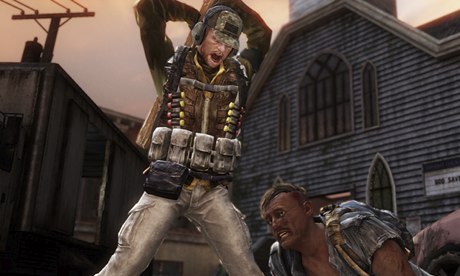
The year was dominated by the promise of a sense of renewal thanks to the early announcement of next-generation consoles PlayStation 4 and Xbox One. Videogames are bound to hardware in a unique, compulsive way, and to witness the frenzied mobilisation of marketing forces and consumer lust was to see the full rage and noise of the industry brought to bear on a race that is, for now, largely ceremonial. Both machines are slick, blank portals of potential; together they provided just one of the year's outstanding games – Resogun on PS4, an old-fashioned arcade shooter that reinvents Armageddon as a frantic cascade of beautiful particle effects.
In the face of this symbolic rejuvenation, elsewhere the year seemed to be doing its best to prove that excellent games could exist on any format regardless of age and power. Three very different handheld titles made the cut: Fire Emblem: Awakening, a devastatingly polished tactical role-player on 3DS; the archaic dystopia of Device 6 ("I am not a number!") which builds a landscape from text and cryptic puzzles on iOS, and PlayStation Vita capped a much improved second year with Tearaway from British studio Media Molecule, a platform adventure of rare delicacy, invention and meaning, exploring and celebrating the act of creativity.
Aside from the console race, the story to attract most media attention was the arrival and extraordinary success of Rockstar's Grand Theft Auto V, a game which makes my top 10 list by force of will and by virtue of immense ambition, its detached fascination with America and the staggering achievement of its recreation of Los Angeles overshadowing occasionally outmoded approaches to mission design and, more troublingly, female characters. Another nonconformist giant that made fewer headlines was developer Valve, although the unveiling of plans to move its vast Steam platform into the living room with open-source hardware and a new controller might prove the more influential in the long term. The company also officially released its long-in-beta arena battler Dota 2, a game of complexity and compulsion.
On the eve of a new era, two of the year's finest games also made a point of looking backwards. The Legend Of Zelda: The Wind Waker HD is a carefully crafted remake of the 10-year-old adventure that marries nostalgia with advancing technology, playing like a idealised memory of the original. And Gone Home, by indie startup The Fullbright Company, turns the exploration of an empty house in 1995 into a moving study of family and identity.
Finally, if the dominant model of the PS360 age was the 10-hour scripted single-player showcase, it reached suitably climactic heights as the era closed. Bioshock Infinite was a visually glorious dash of American imagery and ideology, a dazzle of cultural references and intellectual invention. But the year's best game was Naughty Dog's The Last of Us, which achieved a level of emotional intimacy generally considered impossible for big-budget releases, matched and intensified by lean, brutal gameplay.

